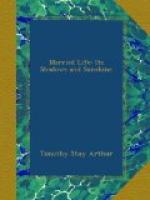“To the Musical Fund Hall, I believe, madam,” he said, standing with his fingers touching the rim of his hat.
I tried to think what I should do. To be conquered was hard. And it was clear that I could not go alone.
“No,” I replied, grasping hold of the first suggestion that came to my mind. “Drive me to No.—Walnut street.”
I had directed him to the house of my sister, where I thought I would stay until after eleven o’clock, and then return home, leaving my husband to infer that I had been to the concert. But long before I had reached my sister’s house, I felt so miserable that I deemed it best to call out of the window to the driver, and direct him to return. On arriving at home, some twenty minutes after I had left it, I went up to my chamber, and there had a hearty crying spell to myself. I don’t know that I ever felt so bad before in my life. I had utterly failed in this vigorous contest with my husband, who had come off perfectly victorious. Many bitter things did I write against him in my heart, and largely did I magnify his faults. I believe I thought over every thing that occurred since we were married, and selected therefrom whatever could justify the conclusion that he was a self-willed, overbearing, unfeeling man, and did not entertain for me a particle of affection.
It was clear that I had not been able to manage my spouse, determined as I had been to correct all his faults, and make him one of the best, most conciliating and loving of husbands, with whom my wish would be law. Still I could not think of giving up. The thought of being reduced to a tame, submissive wife, who could hardly call her soul her own, was not for a moment to be entertained. On reflection, it occurred to me that I had, probably, taken the wrong method with my husband. There was a touch of stubbornness in his nature that had arrayed itself against my too earnest efforts to bend him to my will. A better way occurred. I had heard it said by some one, or had read it somewhere, that no man was proof against a woman’s tears.
On the present occasion I certainly felt much more like crying than laughing, and so it was no hard matter, I can honestly aver, to appear bathed in tears on my husband’s return between eleven and twelve o’clock from the theatre. I cried from vexation as much as from any other feeling.
When Mr. Smith came up into the chamber where I lay, I greeted his presence with half a dozen running sobs, which he answered by whistling the “Craccovienne!” I continued to sob, and he continued to whistle for the next ten minutes. By that time he was ready to get into bed, which he did quite leisurely, and laid himself down upon his pillow with an expression of satisfaction. Still I sobbed on, thinking that every sighing breath I drew was, in spite of his seeming indifference, a pang to his heart. But, from this fond delusion a heavily drawn breath, that was almost a snore, aroused me. I raised up and looked over at the man—he was sound asleep.




